HOW MEMORY IS STORED IN BRAIN?
- BY DR. AK RANA
Ever wonder about memory? how are you able to remember what you wore on your birthday last week? Last year? That’s all part of your memory…
Taste of each and every food that you have eaten, your favorite scent, the book you read yesterday?
Or are you preparing for an upcoming exam and wondering where everything that you are learning is being stored?
All of it in one way or another is called memory. Our precious memory be it good or bad, stays with us.
What will happen if one day when you wake up, your brain is empty and you got no memory to back you?
You will be able to walk, open the fridge to drink water as you felt thirsty, but you won’t remember putting ice-cream in the fridge or whether it’s your favorite or not. You won’t know the password of your laptop, or where to find your laptop or security pattern of your mobile or the person you want to call.
It’s a wonder that since the time we came in this world, we have been observing, learning, feeling and storing it in our memory. All these make us who we are; memory is that much precious asset of our brain.
MEMORY AND LEARNING
Learning is acquiring information, while on the other hand memory is storage of information.
TYPES OF MEMORY
- EXPLICIT MEMORY – it is a declarative memory that is further classified as semantic memory and episodic memory.
Semantic memory- it is related to facts and places.
For example- what is capital of India? Which city is called pink city? Where is statue of liberty located?
In this memory, either you know it or you don’t and depend on the facts/ knowledge that you have learnt.
Episodic memory – It is made up of events in your life. For example- you remember clearly the day when you slipped in the hallway. You were in 4th grade and it was recess time.
Students came out of their classes to laugh at you. Your face and ears turned red and your class teacher came running to rescue you and thereafter sent you too resting room.
It was just an example, but you would have noticed that an embarrassing situation stays with us longer than any other.
Brain areas involved with explicit memory are Hippocampus, medial temporal lobe.
- IMPLICIT MEMORY – It is a non declarative memory.
It includes –
Procedural memory – It is associated with skills. Brain area involved is basal ganglia.
Priming( sensitization) – Neocortex is involved.
For example – watching an episode and already guessing the next scene because of experience of thousands of dramas/movies that you have watched before.
Conditioning – Amygdala, cerebellum.
TYPES OF MEMORY – BASED ON TIME
- Short term memory – ( seconds –minutes )
It depends on attention of person. You can’t remember it just by listening to it. You have to listen carefully with full attention.
Immediate memory –
Digital subtraction test (100-7) up to 5 steps
Working memory
For example- remembering OTP, or saving mobile number.
- Long term memory –(weeks-months)
MECHANISM OF MEMORY STORAGE
For understanding it you must understand limbic system.
Limbic system
It is involved in storing our memory.
It is made up of –
- Hippocampus – memory
- Amygdala – Emotions
- Hypothalamus – (Body temperature, sleep wake cycle, memory)
PARTS OF THE BRAIN ASSOCIATED WITH MEMORY

MEMORY INVOLVES PAPEZ CIRCUIT
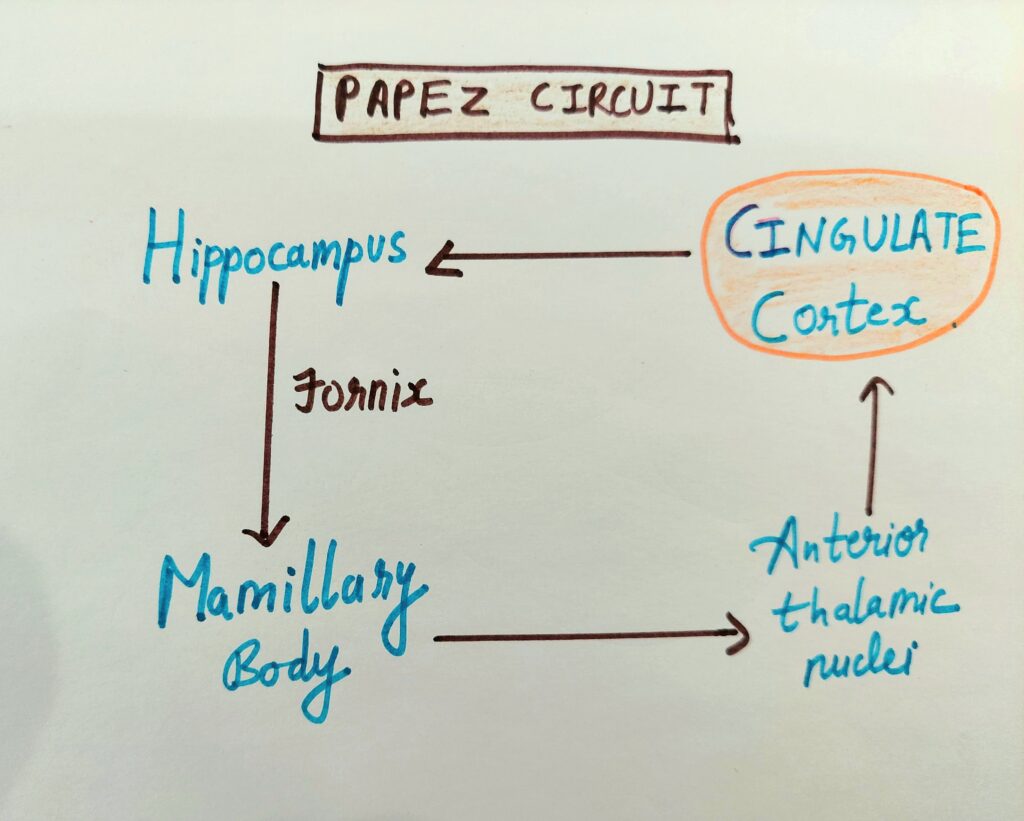
How is memory being converted to long term memory?
In schools and coaching institutes, it is always emphasized to revise and revise. The more you revise, more it will settle in your brain.
Concept is same; our brain has to know the stimulus again and again, to make it a long term memory. This is called SYNAPTIC PLASTICITY.
Synaptic plasticity –it is repeated activity of synapse
- Increased synaptic response-
Post tetanic potentiation
Long term potentiation- associated with hippocampus and involves sensitization.
- Decreased synaptic response-
Long term depression(LTD) –It involves cerebellum(part of brain) and is associated with habituation.
Consolidation or long term potentiation
(Converts short term memory to long term memory)
This consolidation requires CA1 neurons, also called memory neurons. These are found in hippocampus.
Two pathways, direct and indirect are involved in it.
Entorhinal cortex being a part of limbic system either activates CA1 neurons directly or indirectly by firstly activating CA3 neurons which furthermore activates CA1 neurons.
MECHANISM OF LONG TERM POTENTIATION(LTP)
Hebb’s rule – Repeated activation of synapse between CA1 and CA1 neuron, leads to synaptic strengthening and thereby resulting in LTP.
NMDA receptors are blocked by magnesium in resting state. Through AMPA receptors, sodium comes in and depolarization takes place and therefore removing magnesium block.
Now, calcium (2nd messenger) enters through NMDA receptors and activates protein. This results in synaptic strengthening.
OTHER ASPECTS OF MEMORY
- Mamillary bodies – These are associated with recollective memory.
Chronic alcoholism leads to their degeneration leading to Wernicke Korsakoff psychosis (triad of ataxia, confusion and confabulation)
Confabulation- it is making stories to fill in the gaps of forgotten memory.
- In case of lesion of anterior nucleus of thalamus, there is loss of recent memories.
- Alzheimer’s disease – lesion of nucleus basalis of meynert in hippocampus leads to decrease in acetylcholine.
- In case of lesion of hippocampus, our explicit memory is affected leading to anterograde amnesia and inability to form new long term memories.
- Entorhinal cortex – It is associated with olfaction (smell) and its relation with memory.
(Just how smell of certain flowers reminds us about spring; smell of food linked with certain occasions on which they are specially prepared.)
Our most of the talks start with do you remember? Do you know? While we are busy making new memories, our brain is busy storing it.
Although, now you know how a new memory is created and how it stays with us for a long time. So if you are preparing for an exam, strengthen your synapses and generate LTP (converting short term memory to long term memory).
ALSO READ HOW DO WE SLEEP?
ALSO READ HOW TO KEEP HEART HEALTHY?
If you have any questions or want to share your story/views with halleys clinic, reach out to us in comment section.



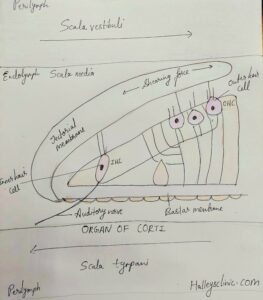


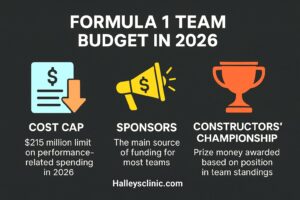
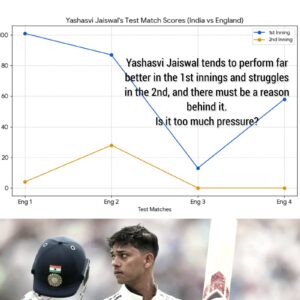
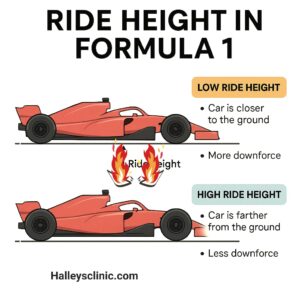
2 thoughts on “HOW MEMORY IS STORED IN BRAIN?”